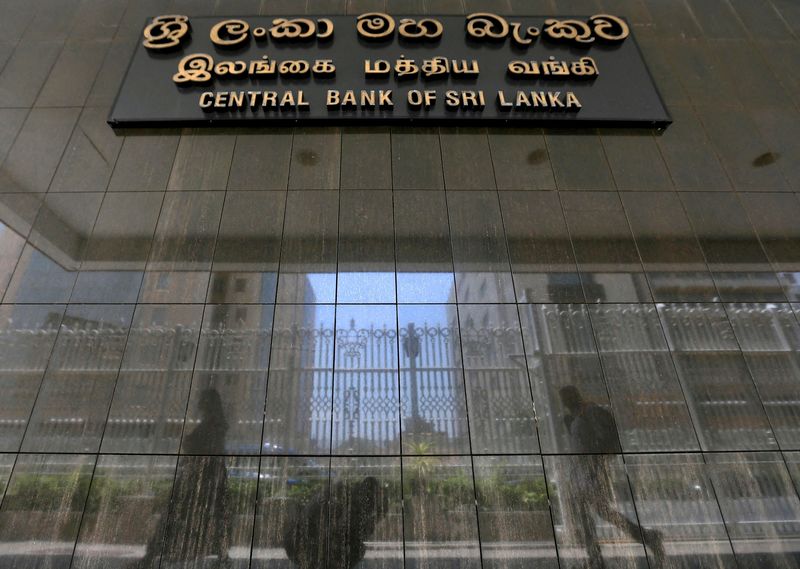By Uditha Jayasinghe and Devjyot Ghoshal
COLOMBO (Reuters) - Sri Lanka's foreign exchange reserves are plummeting, essential imports are stalling and opposition leaders and some experts warn that time is running out to avoid a sovereign default that would further upend the economy.
But Finance Minister Basil Rajapaksa is focused on helping the domestic economy shake off the impact of the COVID-19 pandemic before he seeks assistance from the likes of the International Monetary Fund (IMF), a close aide said.
"We should not be in a hurry to run here and there without sorting out local issues," said Milinda Rajapaksha, who works closely with the finance minister and is an additional director general in the media ministry.
It could take up to four to five months to fix issues like local supply chains and restart businesses, which alongside a pickup in tourism and remittances - both major foreign exchange earners - would help stabilise the economy, Rajapaksha said.
"You have to look at the external debt crisis separately," he told Reuters. "That's what we are going to do. Are we going to look at a package like the IMF? Are we going to work with our neighbours and supporters for more swaps and loans?"
Sri Lanka's foreign exchange reserves are down to $2.36 billion, according to data from the Central Bank of Sri Lanka (CBSL) released earlier this week.
In a note on Monday, Citi Research said that confidence in the Sri Lankan government's external repayment position remains weak and foreign exchange reserves were declining faster than expected.
Sri Lanka has outstanding sovereign bonds amounting to $12.55 billion, with $1 billion of the bonds maturing in July, according to the CBSL. This year, the island's government has to repay debt of around $4 billion.
"We stick to our base-case scenario that international bonds will need to be restructured by July," Citi Research said.
On Wednesday, the CBSL said there was currently no need for discussions on debt restructuring as "the government would be able to ensure the settlement of its sovereign debt without any interruption or default."
"The government and the CBSL are committed to honour all forthcoming debt obligations," the central bank said in a statement.
'VERY DANGEROUS LEVEL'
The lack of dollars is already holding up goods from coming into the import-dependent country of 22 million people, which typically spends about $1.6 billion every month for imports of fuel, essential food and medicine.
In Sri Lanka's main port of Colombo, thousands of containers packed with essentials like rice and sugar have been stuck for weeks because importers are unable to get hold of foreign exchange.
On the streets of Colombo, prices of everything from milk powder and fuel to auto spares and mobile phones are rising.
Headline inflation rose to 14.2%, the highest in more than a decade, with food inflation hitting 25% in January, according to government data.
Sri Lanka is left with usable foreign exchange reserves of around $800 million, which could be exhausted in a matter of weeks, said Murtaza Jafferjee, Managing Director of stock broker JB Securities.
"The amount of reserves basically have come down significantly to a very, very dangerous level," he said.
To meet the shortfall, Sri Lanka's government has sought help from India with a $1 billion credit line. It is also in talks with Pakistan and Australia for two credit lines of $200 million each for imports of rice, cement, grains and medicine.
In January, President Gotabaya Rajapaksa sought debt relief from China and assistance to pay for imports. Sri Lanka imports about $3.5 billion worth of goods from China every year.
POLITICAL FUTURE
The government, led by the influential Rajapaksa family, faces a choice between moving immediately to restructure its debt or continuing to scrape by even as it hits ordinary Sri Lankans, said Nishan de Mel, Executive Director of Verité Research think-tank.
"So, it is really a question of how much pain the society can bear and how much pain the government is willing to inflict before it changes the path," he said. "It is not a path that looks to be sustainable."
The IMF on Thursday said the Sri Lankan government had not initiated talks for financial support.
"Of course, we stand ready to discuss options if requested and we continue to closely monitor economic and policy developments," IMF spokesman Gerry Rice said in an online briefing.
For finance minister and veteran lawmaker Rajapaksa, the decision to go to the IMF or another external agency will also depend on political considerations, his aide Rajapaksha said.

The powerful politician is the younger brother of the president and of Prime Minister Mahinda Rajapaksa, and took over the finance portfolio in July, 2021 as the economic crisis gathered steam.
"His political future is on the line," Rajapaksha said, referring to the finance minister. "And his political party's future is on the line."